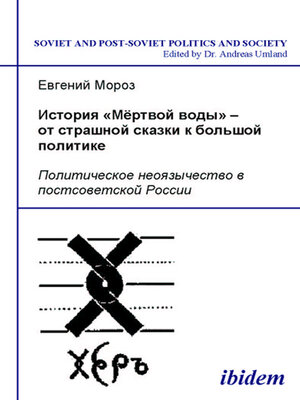Istoriia "Mertvoi vody"--ot strashnoi skazki k bol'shoi politike
ebook ∣ Politicheskoe neoiazychestvo v postsovetskoi Rossii · Soviet and Post-Soviet Politics and Society
By Evgenii Moroz

Sign up to save your library
With an OverDrive account, you can save your favorite libraries for at-a-glance information about availability. Find out more about OverDrive accounts.
Find this title in Libby, the library reading app by OverDrive.



Search for a digital library with this title
Title found at these libraries:
| Library Name | Distance |
|---|---|
| Loading... |
In the early 1990s, a group of supporters of a revival of old-Russian pagan beliefs started to call itself "Internal Predictor of the USSR." They, later, initiated a political movement named "Towards God's Rule" and the so-called Conceptual Party "Unification." They assert that their doctrine of Russian society's security, called "Dead Water," will cure all wounds of Russia like magic, and guarantee the well-being and prosperity of the Russian people. The expressions of modern Russian neo-paganism are usually considered to be marginal and insignificant phenomena. However, the group of high-ranking military men, university teachers and converted communist functionaries analyzed here has succeeded to raise considerable attention and respect for pagan ideology in Russian society. This has made a certain impression on a number of representatives of the Russian political elite including deputies of the State Duma and employees of the special services. The peculiar version of neo-pagan ideology analyzed here is a result of a reformulation of Stalinist ideology. It has cut off its Marxist roots, and incorporates religious mysticism, the theory of a worldwide conspiracy, some fantastic assertions about Russian culture, various borrowings from Nazism, references to the wisdom of the Koran and a conceptual approach to modern theories of management complemented with para-scientific economic theorizing. The exotic doctrine of the "Internal Predictor" has had a certain resonance in post-Soviet Russia. After a noisy propaganda campaign before the elections to the State Duma in 2003, the movement propagating "Dead Water" was extensively covered by the Russian press. However, it has not been the subject of indepth research so far.







